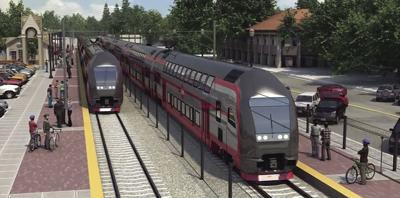Caltrain announced Friday its electrification project faces $462 million in additional costs due to its settlement with contractor Balfour Beatty and project changes, higher than its initial June estimate of $333 million.
Total project costs will go from $1.98 billion to $2.44 billion. Caltrain noted the additional costs are due to negotiations and settlements with Balfour Beatty, which is in charge of project construction. The payment addressed commercial issues and costs due to the delay until 2024 of project completion, including disputes about cost responsibility for a new grade crossing protection system, according to a Caltrain staff report. The cost overruns were previously estimated at $333 million by the Federal Transit Administration, but the estimation was before the Balfour Beatty settlement agreement and detailed project budget update, Caltrain staff said.
Caltrain in June announced it would be delaying electric service until September 2024 because of the expected project cost increases. It made the initial delay decision based on a risk refresh report from the Federal Transit Administration. Caltrain staff in June said cost overruns come from unknown underground site conditions, Pacific Gas and Electric costs and extra construction support. COVID-19 global safety measures have also slowed assembly production at sites.
Electrified service is part of the Caltrain Modernization Program, electrifying 51 miles from San Francisco’s Fourth and King Caltrain Station to San Jose. Caltrain has said electric service would improve train performance, increase service and capacity, improve regional air quality, reduce greenhouse gas emissions and reduce engine noise. Electrification improvements include converting diesel-hauled trains to electric and would increase service to six trains per peak hour per direction. The proposed project would lead to a tripling of ridership for the service agency, of particular importance as it moves to increase ridership following the pandemic.
Caltrain said it is working with its financial partners and federal and state legislative delegations to find funding. It has received around $52.4 million from the federal government, with the Federal Infrastructure and Investment Jobs Act and the state transportation budget are additional funding options. Caltrain staff said the three Bay Area member agencies of Caltrain also have the option of providing financing, while Caltrain can look at using Measure RR revenue. The three agencies are the San Mateo County Transportation Authority, Santa Clara Valley Transportation Authority and the San Francisco County Transportation Authority. Staff plans to present funding options in January.
Construction has continued while Caltrain finalizes a funding plan over the past few months. Currently, 95% of foundations have been installed, with most civil work complete. Other project construction will be on signal and system testing and integration work. The total fleet of 19 electric trains will be delivered by late 2023.
The Caltrain board approved the contract with Balfour Beatty to build and design the project in July 2016. Project construction began in 2017. The original project finish schedule was August 2022. The Caltrain board will meet Monday, Dec. 3, to authorize the settlement with Balfour Beatty and increase the budget to add the project cost overruns.




















(0) comments
Welcome to the discussion.
Log In
Keep the discussion civilized. Absolutely NO personal attacks or insults directed toward writers, nor others who make comments.
Keep it clean. Please avoid obscene, vulgar, lewd, racist or sexually-oriented language.
Don't threaten. Threats of harming another person will not be tolerated.
Be truthful. Don't knowingly lie about anyone or anything.
Be proactive. Use the 'Report' link on each comment to let us know of abusive posts.
PLEASE TURN OFF YOUR CAPS LOCK.
Anyone violating these rules will be issued a warning. After the warning, comment privileges can be revoked.